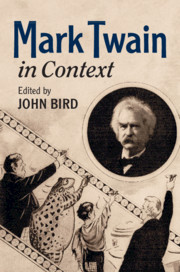Book contents
- Mark Twain in Context
- Mark Twain in Context
- Copyright page
- Contents
- Figures
- Contributors
- Preface
- Acknowledgments
- Chronology
- Abbreviations
- Part I Life
- Chapter 1 Biography
- Chapter 2 Reading
- Chapter 3 Autobiography
- Chapter 4 Biographies
- Part II Literary Contexts
- Part III Historical and Cultural Contexts
- Part IV Reception and Criticism
- Part V Historical, Creative, and Cultural Legacies
- Further Reading
- Index
- References
Chapter 1 - Biography
from Part I - Life
Published online by Cambridge University Press: 12 December 2019
- Mark Twain in Context
- Mark Twain in Context
- Copyright page
- Contents
- Figures
- Contributors
- Preface
- Acknowledgments
- Chronology
- Abbreviations
- Part I Life
- Chapter 1 Biography
- Chapter 2 Reading
- Chapter 3 Autobiography
- Chapter 4 Biographies
- Part II Literary Contexts
- Part III Historical and Cultural Contexts
- Part IV Reception and Criticism
- Part V Historical, Creative, and Cultural Legacies
- Further Reading
- Index
- References
Summary
Samuel Clemens was born in 1835 in Missouri. He spent his childhood by the Mississippi River in Hannibal, Missouri. He was a printer’s apprentice, then was a journeyman printer, then earned a pilot’s license on the Mississippi River. He went west to Nevada, avoiding the Civil War, then became a newspaper writer. In February 1863, he signed an article with the pen name “Mark Twain,” beginning the creation of his alter ego. His 1867 trip to Europe and the Holy Land led to his travel book The Innocents Abroad. Upon his return to America, he met Olivia Langdon in Elmira, New York, and they married in 1870. A son, Langdon, died in infancy, but Sam and Livy had three daughters: Susie, Clara, and Jean. Most summers were spent in Elmira, where Twain composed many of his most famous works, including The Adventures of Tom Sawyer and Adventures of Huckleberry Finn. He turned his attention to business adventures, including starting his own publishing company, but also a series of investments, most of which ended in failure. In his last decade, he increasingly spoke out about politics. He died in 1910, his popularity assured by his works and his public persona.
- Type
- Chapter
- Information
- Mark Twain in Context , pp. 3 - 13Publisher: Cambridge University PressPrint publication year: 2020

